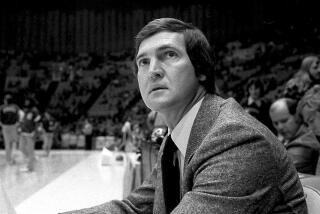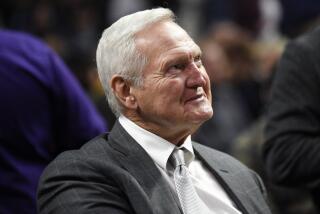Jerry Sloan, the face of the Utah Jazz, calls it a career
- Share via
Jerry Sloan never got an NBA title, or was named most valuable player or selected as coach of the year.
All he ever won was all the respect and admiration the NBA had to give in 37 years of rock-solid devotion, the last 23 in Utah as the longest-serving coach in the four major U.S. professional leagues …
FOR THE RECORD:
NBA Coach Jerry Sloan: In the Feb. 11 Sports section, a quotation displayed with an article about Utah Jazz Coach Jerry Sloan’s resignation was mistakenly attributed to Sloan. As the article noted, the quote —”It’s a process. It’s not like it’s one night or one practice or one game.” -- was said by longtime Utah assistant coach Phil Johnson, who also resigned.
Until Thursday, when he resigned three days after signing a one-year contract extension.
At 68, Sloan wasn’t just the face of the Jazz franchise. If it had a Mt. Rushmore, one of the heads would be missing.
“We’re all kind of sad that we’re losing a big figure from our game,” Lakers Coach Phil Jackson said Thursday in Boston, joining the torrent of praise for Sloan all around the NBA.
His voice cracking with emotion — something else few had ever seen — a hollow-cheeked Sloan made the announcement at a news conference in Salt Lake City.
“This is going to be harder than I thought,” he said.
“My time is up and it’s time to move on.”
Sloan said he was leaving because of fatigue, not because of any problem with management or players.
Actually, he was having trouble with All-Star point guard Deron Williams and didn’t think he was being backed up by third-year owner Greg Miller.
Sloan and Williams reportedly argued angrily at halftime of Wednesday’s home loss to the Bulls, Utah’s 10th in 14 games.
Sloan “decided right there in halftime that he was done,” a person with knowledge of the situation told Yahoo Sports. “He felt like ownership was listening more to Williams than they were to him anymore. He was done.”
Delaying his news conference after Wednesday’s game, Sloan met with General Manager Kevin O’Connor, informing him he would resign.
O’Connor asked him to sleep on it. So Sloan got up Thursday morning and resigned.
The Jazz named assistant coach Ty Corbin to replace Sloan, or at least succeed him.
Meanwhile, the other grand old man on the Utah bench, Sloan’s longtime assistant Phil Johnson, resigned too.
Suggesting this had been building, Johnson told a Salt Lake City TV station, “It’s a process. It’s not like it’s one night or one practice or one game.”
The surprise was that Sloan stayed as long as he did to coach players so young after Karl Malone and John Stockton left in 2003.
In the summer of 2004, Sloan’s wife, Bobbye, died of cancer after a long fight, once appearing at a news conference to describe her condition with her husband holding her hand. In Salt Lake City, the Sloans were family.
Defying expectations, Sloan had a new team built around Williams, snared by O’Connor in the 2005 draft, that won 51 games within four years of the departure of Stockton and Malone.
Nevertheless, the Jazz kept running into the Lakers, who eliminated them in the last three postseasons.
Noting that he tried to talk Sloan into staying, Miller said, “I want to make it clear that nobody pushed Jerry or Phil out.
“I loved and respected Jerry for as long as I can remember. … I will miss him but benefit from the things he taught me for the rest of my life.”
Miller hasn’t even begun to miss Sloan yet.
With Utah’s reputation as a solid franchise, there had been little mention of Williams as a 2012 free agent while speculation about New Orleans’ Chris Paul was constant.
With so much of what made the Jazz what it was disappearing in a day, expect to hear Williams’ name more often.
More to Read
Go beyond the scoreboard
Get the latest on L.A.'s teams in the daily Sports Report newsletter.
You may occasionally receive promotional content from the Los Angeles Times.










